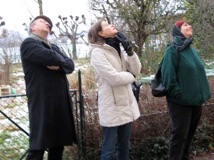Europe and the United States have a long relationship. Maybe that’s why we take it for granted - when we shouldn’t. Majoring in French and studying for a year in Paris as an undergraduate in the 1960’s gave me a solid grounding in French-US cultural relations. But I was also studying German and spending time in Germany that same year, which gave me an early appreciation of the differences between these two traditional rivals.
Launching a film project with the dean of French documentarians, the director Georges Rouquier, known primarily for his classic feature Farrebique (1944-45) gave me new insights into what they call “La France profonde.” I loved it. My outsider/insider status also helped move the project forward when the whole idea seemed folly. The feature film that resulted, entitled Biquefarre, won the Jury’s Special Prize at the Venice Film Festival in 1983.
Since 1993, I have been heavily involved with the European-American dialogue through my work as director of electronic media projects in North America for the Goethe-Institut / German Cultural Centers.
I continued my special interest in French culture at the same time, working with my colleagues to identify projects that would bring the Goethe-Institut together with French partners for a more widely European perspective. In 2003, I was awarded the honor of being named a Chevalier by the French government in the Ordre des Palmes Académiques as a result.
My work for the Goethe-Institut meant development, production, or co-production of a wide variety of projects using the electronic media - video, audio, internet - and distributed via television, radio, internet, or DVD/CD.
Early projects with the Goethe-Institut involved live discussions by satellite between Washington and Berlin, with the resulting video edited into shorter pieces for distribution via public television broadcast or on videotape.
Probably the largest Goethe project I was involved with was the four-part television series “The Germans in America / Deutsche in Amerika,” produced by Axel Engstfeld Filmproduktion in Cologne for WDR/ARTE. Involved in the project from the outset as the co-producer for the Goethe-Institut, I co-produced the US adaptation with South Carolina ETV. The series was then distributed for public television in the USA by NETA. SCETV distributes the DVDs for personal and educational use.
Europe is much more than France and Germany, however. I have traveled widely beyond those two countries and have become deeply involved in projects in Łódź, Poland. I currently serve on the Board of Directors of the Friends of the Goethe-Institut in Washington, DC and am also vice-president of the local board of the Kosciuszko Foundation’s DC Center for Polish Culture.





